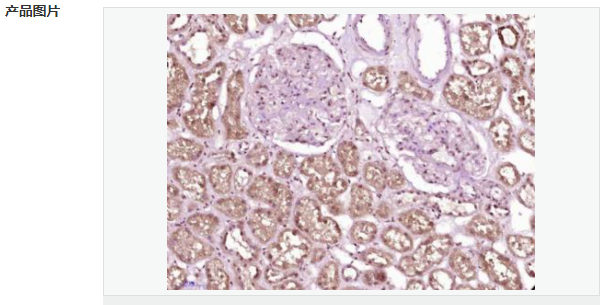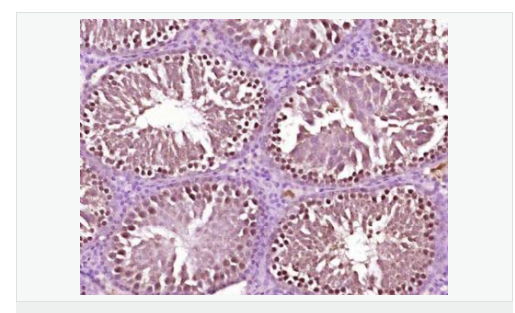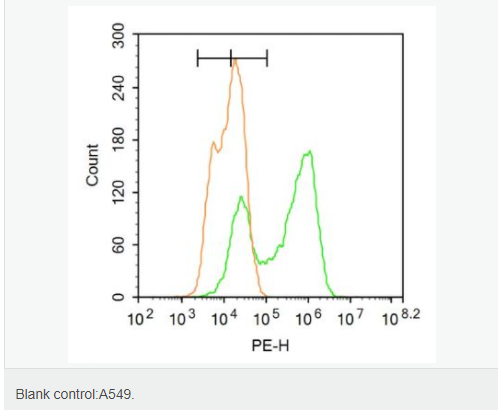
货号
产品规格
售价
备注
BN41706R-50ul
50ul
¥1486.00
交叉反应:Human,Rat(predicted:Mouse,Dog) 推荐应用:IHC-P,IHC-F,IF,Flow-Cyt,ELISA
BN41706R-100ul
100ul
¥2360.00
交叉反应:Human,Rat(predicted:Mouse,Dog) 推荐应用:IHC-P,IHC-F,IF,Flow-Cyt,ELISA
BN41706R-200ul
200ul
¥3490.00
交叉反应:Human,Rat(predicted:Mouse,Dog) 推荐应用:IHC-P,IHC-F,IF,Flow-Cyt,ELISA
| 英文名称 | BRG-1 |
| 中文名称 | 抑癌基因SNF2β抗体 |
| 别 名 | BRG1; ATP dependent helicase SMARCA4; BAF 190; BAF190; BAF190A; Brahma protein homolog 1; Brahma protein like 1; BRG 1; BRG 1 protein; BRG1; BRG1 associated factor 190A; BRG1 protein; BRM/SWI2 related gene 1; Global transcription activator homologous sequence; Homeotic gene regulator; hSNF2b; Mitotic growth and transcription activator; Nuclear protein GRB1; Probable global transcription activator SNF2L4; Protein brahma homolog 1; Protein BRG1; SMARC A4; SMARCA 4; SMARCA4; SNF 2; SNF 2B; SNF2;;brahma-related gene 1; SNF2 beta; SNF2 like 4; SNF2B; SNF2beta; SNF2L4; SNF2LB; SWI 2; SWI/SNF related matrix associated actin dependent regulator of chromatin subfamily A member 4; SWI2; Transcription activator BRG1. |
| 研究领域 | 肿瘤 免疫学 细胞凋亡 转录调节因子 |
| 抗体来源 | Rabbit |
| 克隆类型 | Polyclonal |
| 交叉反应 | Human, Rat, (predicted: Mouse, Dog, ) |
| 产品应用 | ELISA=1:5000-10000 IHC-P=1:100-500 IHC-F=1:100-500 Flow-Cyt=3ug/test IF=1:100-500 (石蜡切片需做抗原修复) not yet tested in other applications. optimal dilutions/concentrations should be determined by the end user. |
| 分 子 量 | 185kDa |
| 细胞定位 | 细胞核 |
| 性 状 | Liquid |
| 浓 度 | 1mg/ml |
| 免 疫 原 | KLH conjugated synthetic peptide derived from human SMARCA4:51-167/1647 |
| 亚 型 | IgG |
| 纯化方法 | affinity purified by Protein A |
| 储 存 液 | 0.01M TBS(pH7.4) with 1% BSA, 0.03% Proclin300 and 50% Glycerol. |
| 保存条件 | Shipped at 4℃. Store at -20 °C for one year. Avoid repeated freeze/thaw cycles. |
| PubMed | PubMed |
| 产品介绍 | The protein encoded by this gene is a member of the SWI/SNF family of proteins and is similar to the brahma protein of Drosophila. Members of this family have helicase and ATPase activities and are thought to regulate transcription of certain genes by altering the chromatin structure around those genes. The encoded protein is part of the large ATP-dependent chromatin remodeling complex SNF/SWI, which is required for transcriptional activation of genes normally repressed by chromatin. In addition, this protein can bind BRCA1, as well as regulate the expression of the tumorigenic protein CD44. Alternatively spliced transcripts have been found for this gene, but their full-length natures have not been determined. Function: Transcriptional coactivator cooperating with nuclear hormone receptors to potentiate transcriptional activation. Component of the CREST-BRG1 complex, a multiprotein complex that regulates promoter activation by orchestrating a calcium-dependent release of a repressor complex and a recruitment of an activator complex. In resting neurons, transcription of the c-FOS promoter is inhibited by BRG1-dependent recruitment of a phospho-RB1-HDAC repressor complex. Upon calcium influx, RB1 is dephosphorylated by calcineurin, which leads to release of the repressor complex. At the same time, there is increased recruitment of CREBBP to the promoter by a CREST-dependent mechanism, which leads to transcriptional activation. The CREST-BRG1 complex also binds to the NR2B promoter, and activity-dependent induction of NR2B expression involves a release of HDAC1 and recruitment of CREBBP. Belongs to the neural progenitors-specific chromatin remodeling complex (npBAF complex) and the neuron-specific chromatin remodeling complex (nBAF complex). During neural development a switch from a stem/progenitor to a post-mitotic chromatin remodeling mechanism occurs as neurons exit the cell cycle and become committed to their adult state. Subunit: Belongs to the SNF2/RAD54 helicase family. Contains 1 bromo domain. Contains 1 helicase ATP-binding domain. Contains 1 helicase C-terminal domain. Contains 1 HSA domain. Tissue Specificity: Colocalizes with ZEB1 in E-cadherin-negative cells from established lines, and stroma of normal colon as well as in de-differentiated epithelial cells at the invasion front of colorectal carcinomas (at protein level). DISEASE: Defects in SMARCA4 are the cause of rhabdoid tumor predisposition syndrome type 2 (RTPS2). RTPS2 is a familial cancer syndrome predisposing to renal or extrarenal malignant rhabdoid tumors and to a variety of tumors of the central nervous system, including choroid plexus carcinoma, medulloblastoma, and central primitive neuroectodermal tumors. Rhabdoid tumors are the most aggressive and lethal malignancies occurring in early childhood. SWISS: P51532 Gene ID: 6597 Database links: Entrez Gene: 6597 Human Entrez Gene: 20586 Mouse Omim: 603254 Human SwissProt: P51532 Human SwissProt: Q3TKT4 Mouse Unigene: 327527 Human Unigene: 286593 Mouse Unigene: 23417 Rat Important Note: This product as supplied is intended for research use only, not for use in human, therapeutic or diagnostic applications. 转录调节因子(Transcriptin Regulators) SMARCA4是一种新的抑癌基因,已在许多肿瘤的研究中发现它是一种重要的抑癌基因,很多肿瘤的发生与其功能失活或出现基因突变、缺失相关联。 |


